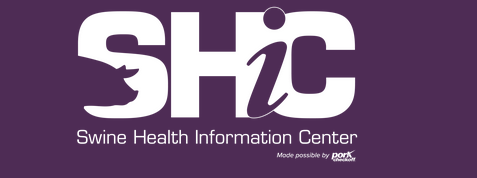
The Swine Health Information Center’s Wean-to-Harvest Biosecurity Research Program, funded in collaboration with the Foundation for Food & Agriculture Research and the Pork Checkoff, has recently funded two new projects to advance biosecurity of US swine farms. The newly funded projects include: 1) an investigation of alternative methods for transport sanitation led by Dr. Erin Kettelkamp at the Swine Vet Center and 2) an assessment of the cost of disease in grow-finish production sites led by Dr. Karyn Havas at Pipestone Research. These awards bring the total number of projects to 18 that have been funded by the program for a comprehensive approach to enhancing biosecurity across the wean-to-harvest phases of swine production.
Priorities of the Wean-to-Harvest Biosecurity Research Program focus on site and transportation biosecurity in five targeted areas: 1) personnel biocontainment and bioexclusion, 2) mortality management, 3) truck wash efficiency, 4) alternatives to fixed truck wash, and 5) packing plant biocontainment. The research program reflects SHIC’s responsiveness to an identified swine health vulnerability and collaborative efforts to leverage producer Checkoff funds to safeguard the health of the US swine herd. Proactively enhancing wean-to-harvest biosecurity will help control the next emerging disease in the US pork industry. All proposals submitted undergo a competitive review process by a task force of industry stakeholders with funding recommendations approved by the SHIC Board of Directors, FFAR, and Pork Checkoff. Projects are reviewed for their value to pork producers and their ability to provide cost-effective biosecurity solutions on the farm.
Novel tools, technologies and approaches are needed to augment current biosecurity practices in the US swine industry. Each of the two newly funded projects investigate new ways of thinking about wean-to-harvest biosecurity. First, a project led by Dr. Erin Kettelkamp at the Swine Vet Center was awarded entitled “Investigating waterless decontamination and application potential in transportation biosecurity.” This project seeks to investigate the efficacy of a new waterless technology for the mobile application of heat and hydrogen peroxide to decontaminate PEDV in trailers and provide an alternative method for achieving necessary transport sanitation.
Second, a project led by Dr. Karyn Havas at Pipestone Research was awarded entitled “What is the cost of disease for grow-finish producers?” This project seeks to understand the cost of common diseases detected in grow-finish hogs through quantification of disease outcome indicators, such as mortality and weight gain. Costs of disease will be compared to costs required for implementation of different biosecurity practices to provide producers an objective understanding of the potential opportunity cost forfeited through poor biosecurity.
The Wean-to-Harvest Biosecurity Program continues to accept research proposal submissions which address the five targeted priority areas until funds have been expended. Total project funds available for the Program since its inception are $2.3 million. Real-time results of all projects will be shared as quickly as they become available for producers to implement knowledge gained on the farm.
Foundation for Food & Agriculture Research
The Foundation for Food & Agriculture Research (FFAR) builds public-private partnerships to fund bold research addressing big food and agriculture challenges. FFAR was established in the 2014 Farm Bill to increase public agriculture research investments, fill knowledge gaps and complement the U.S. Department Agriculture’s research agenda. FFAR’s model matches federal funding from Congress with private funding, delivering a powerful return on taxpayer investment. Through collaboration and partnerships, FFAR advances actionable science benefiting farmers, consumers and the environment.
Swine Health Information Center
The Swine Health Information Center, launched in 2015 with Pork Checkoff funding, protects and enhances the health of the US swine herd by minimizing the impact of emerging disease threats through preparedness, coordinated communications, global disease monitoring, analysis of swine health data, and targeted research investments. As a conduit of information and research, SHIC encourages sharing of its publications and research. Forward, reprint, and quote SHIC material freely. For more information, visit http://www.swinehealth.org or contact Dr. Megan Niederwerder at mniederwerder@swinehealth.org or Dr. Lisa Becton at lbecton@swinehealth.org.





